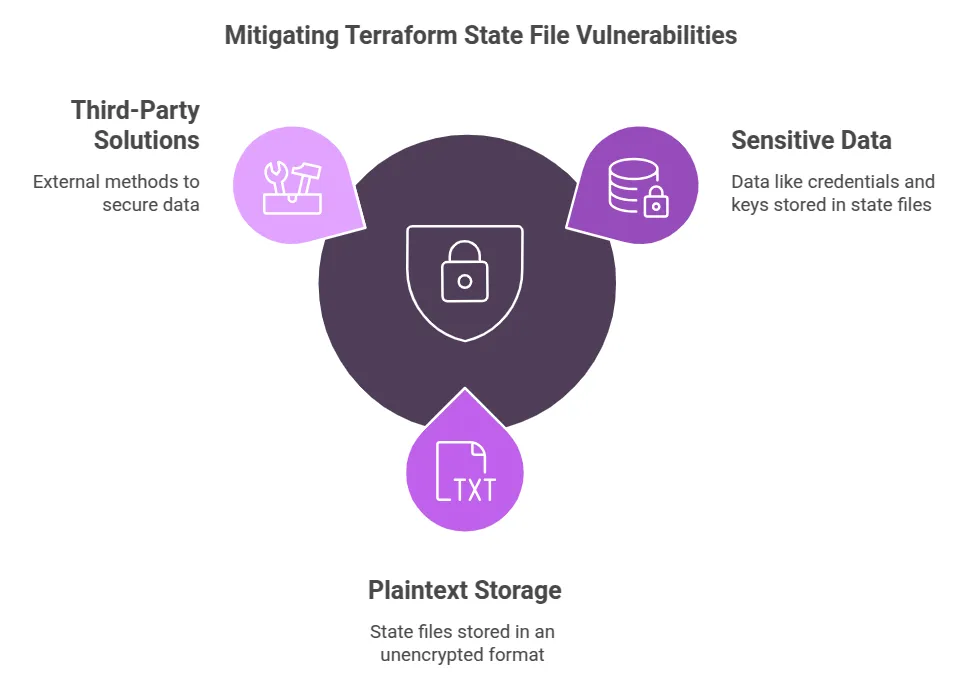February 6, 2025
End-to-End Encryption for State Files in OpenTofu

By Rakshit Menpara
Improwised Technologies Pvt. Ltd.
Terraform state files contain crucial information about the infrastructure managed by Terraform, including sensitive data such as database credentials, API keys, and other secrets.

The Need for State File Encryption
Historically, these state files were stored in plaintext, making them vulnerable to unauthorized access. If an attacker gained access to the state file, they could exploit the sensitive data to compromise the entire infrastructure.
To mitigate this risk, users had to rely on third-party solutions, such as encrypting S3 buckets using AWS KMS or other key management systems. However, even with bucket-level encryption, the state files themselves remained in plaintext, exposing them to potential breaches if the storage was compromised.
End-to-End State Encryption in OpenTofu 1.7.0
OpenTofu 1.7.0 introduces native end-to-end state encryption, ensuring that state files are encrypted both at rest and in transit. Here are the key components of this feature:
Encryption Configuration
To enable state file encryption in OpenTofu, users must add an encryption block to their configuration code or use the TF_ENCRYPTION environment variable. The encryption block requires the following parameters:
-
key_provider: This specifies the provider for the encryption key. Supported providers include PBKDF2, AWS KMS, GCP KMS, and OpenBao.
-
method: This determines the encryption method to be used. Currently, the primary supported option is AES-GCM, which allows the use of 16, 24, or 32-byte keys.
Here is an example of how the encryption block might be configured:
terraform {
encryption {
key_provider "aws_kms" "basic" {
kms_key_id = "a4f791e1-0d46-4c8e-b489-917e0bec05ef"
region = "us-east-1"
key_spec = "AES_256"
}
}
}
Key Management
Users can specify the encryption key directly or use a remote key provider. The ability to integrate with key management systems like AWS KMS, GCP KMS, or OpenBao enhances the security and manageability of the encryption keys. This integration allows for centralized key management and rotation, which is crucial for maintaining the security posture of the organization.
Encryption and Decryption Process
The encryption process involves using the specified key to encrypt the state files. When the state files are stored on the local disk or transferred to a remote backend, they are encrypted. The encrypted files remain valid JSON files but are no longer readable without the decryption key.
For decryption, the same key used for encryption is required. OpenTofu also supports re-encrypting state or plan files with a newer key after decrypting them with an older key, facilitating key rotation and ensuring that the data remains secure even if older keys are compromised.
Remote State Files and Plan Files
The state encryption feature in OpenTofu extends to remote state files and plan files. Users can encrypt remote state files using the terraform_remote_state data source, ensuring that sensitive data is protected even when accessed from remote backends. Plan files, which are undocumented binary files, can also be encrypted, though they require special handling due to their binary nature.
Configuration Flexibility
OpenTofu provides flexibility in configuring the encryption settings. Users can specify the encryption configuration both in HCL code and through environment variables. This flexibility is particularly useful for reusing code across different environments, some of which may require encryption while others do not.
Here is an example of using environment variables to configure encryption:
js export TF_ENCRYPTION=$(cat <
Fallback Configurations and Key Rotation
To ensure continuity and security, OpenTofu allows users to define fallback configurations. This feature facilitates automatic rollover to a different key or configuration if the primary key or configuration becomes unavailable. Key rotation is also supported, enabling users to decrypt data with an older key and then re-encrypt it with a newer key, which is essential for maintaining security best practices.
Security Implications
The introduction of end-to-end state encryption in OpenTofu significantly enhances the security of Terraform state files. Here are some key security implications:
-
Data Protection: State files are now encrypted both at rest and in transit, protecting sensitive data from unauthorized access. Even if an attacker gains access to the storage, they will not be able to read the encrypted data without the decryption key.
-
Compliance: This feature helps organizations comply with regulatory requirements that mandate the encryption of sensitive data. By ensuring that state files are encrypted, organizations can meet these compliance standards more effectively.
-
Layered Security: End-to-end encryption aligns with the layered security model, where multiple layers of security are implemented to protect data. This approach reduces the risk of data breaches by making it more difficult for attackers to access sensitive information.
Conclusion
The end-to-end state encryption feature in OpenTofu 1.7.0 is a critical enhancement for the security of Terraform state files. By encrypting state files natively, OpenTofu ensures that sensitive data is protected from unauthorized access, whether the files are stored locally or in remote backends. Failure to implement state file encryption can have severe consequences. Unencrypted state files are highly susceptible to unauthorized access, potentially leading to devastating data breaches and compromising the entire infrastructure. Moreover, neglecting encryption can result in serious violations of regulatory compliance, incurring significant fines and severely damaging the organization’s reputation. Furthermore, without encryption, sensitive data within state files remains vulnerable to exploitation, continuously exposing the organization to significant security risks.In summary, the end-to-end state encryption feature in OpenTofu is a necessary step towards securing sensitive data in Terraform state files. It aligns with best practices in data security and helps organizations maintain a robust security posture.

December 17, 2025
Cloud to On-Premises Migration: Costs, Performance & Strategic Benefits

By Shyam Kapdi
Improwised Technologies Pvt. Ltd.

December 12, 2025
Continuous Deployment with FluxCD: Architecture, Flow & Best Practices

By Shyam Kapdi
Improwised Technologies Pvt. Ltd.

December 10, 2025
CI with GitHub Actions: End-to-End Pipeline Setup Guide

By Shyam Kapdi
Improwised Technologies Pvt. Ltd.
Optimize Your Cloud. Cut Costs. Accelerate Performance.
Struggling with slow deployments and rising cloud costs?
Our tailored platform engineering solutions enhance efficiency, boost speed, and reduce expenses.
